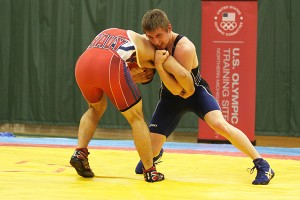
“Hearing [the news] calmed me that we were going to be OK.”Nick Alvarez, Northern Michigan University sophomore and USOEC Greco-Roman wrestler, wakes up every day with the same goal in mind: to make it one workout closer to competing in the Olympics.
“Around our practice schedule, we have to fit school, meals, naps and homework -— not necessarily in that order,” Alvarez said. “We are encouraged to do extra workouts on our own when our schedules permit it.”
Alvarez has been competing at NMU with the USOEC Greco-Roman wrestling team since 2010.
Underneath head coach Rob Hermann and assistant coach Aghasi Manukyan, he started earning medals in his respective weight division, competing in the Kolbotn Cup in Norway in his debut performance for the team. Collectively, Alvarez has collected six medals as a member of the USOEC team.
Alvarez said he has held onto one main objective while training and competing in the USOEC.
“My final goal is to win an Olympic and/or world gold medal,” Alvarez said. “I want to complete my education as I train, too, for my opportunity.”
Last semester, Alvarez’s goals and training faced potential jeopardization.
On Tuesday, Feb. 12, 2013, the International Olympic Committee (IOC) executive board moved to push a vote that would eliminate wrestling from the 2020 Olympic Games.
“I was in Havana, Cuba for a competition when I heard the news on their local news station,” Alvarez said. “I was scared at first. The IOC was trying to take away the sport that I love dearly and devoted most of my life to.”
Nearly seven months later, on Sunday, Sept. 8, the IOC overturned their previous decision and moved to keep wrestling an active part in the 2020 Games according to the NMU Athletic Department.
Junior wrestler Dillon Cowan, who earned two bronze medals last season and started competing three and a half years ago, said the lifestyle that is acquired from being on the team would be hard to lose if the program ceased to take place in the Olympics.
“We practice 10 times a week,” Cowan said. “Mondays through Fridays, we practice twice a day and once a day on Wednesday and Sunday. We do this for 10 months of the year.”
When the announcement was made pertaining to the IOC’s vote to keep wrestling a part of the Olympic Games, Cowan said the team was extremely happy.
“When they finally came out with the final decision, I heard everyone in the dorms run down the hall and [they] were cheering but I wasn’t there to see it. I had called my dad right away to tell him.”
NMU athletic director Forrest Karr said the IOC’s reinclusion of the wrestling program in future Olympic Games is a good thing to know following last February.
“Obviously, it’s a good thing,” Karr said. “It’s a good, solid agreement for a great program here. The kids do a wonderful job at reaching for their goals and almost all of them are students here. There are 42 of them in the program this year and they do a great job at reaching their aspirations. It’s great.”
According to Karr, the IOC’s February decision would not have affected the 2016 Olympic Games set to take place in Rio de Janeiro but would have come into effect for the 2020 and 2024 Games.
Karr said the students show how much effort they put into the sport by attending classes like normal students while still competing in Olympic-style events.
“On average, students in the USOEC average well over 13 credits per semester,” Karr said. “They put a lot of work into what they do there and work the same as other students.”
Alvarez said the vote to end wrestling in future Olympic Games had not slowed down the team as they trained for 2016, but the latest vote to keep the program in the event is comforting.
“I’m glad [wrestling] is back in because it gives me another Olympic cycle to aim for, along with people like my teammate Isaiah Varona’s little brother, Elijah,” Alvarez said. “It gives him a goal to look forward to. He is 14 now. Odds are he won’t make the 2016 team but 2020 is a more realistic goal.”
























